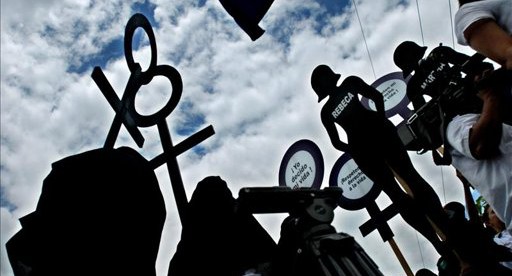
A 10-year-old girl allegedly impregnated by her stepfather will not be allowed to have an abortion under Paraguay’s laws, drawing strong condemnation from United Nations experts who say forcing her to have the child constitutes a human rights violation.
In a statement released this week, the UN experts said Paraguay has refused to provide treatment to save the life of the girl, who is five months pregnant, “including safe and therapeutic abortion in a timely manner.”
The girl’s pregnancy – which came to light in national and international media several weeks ago – was the result of repeated sexual abuse allegedly perpetrated by her stepfather. But abortion is a criminal offense in Paraguay, a conservative mostly Roman Catholic country, except in cases when the mother’s life is in danger, and the Paraguayan government is standing by its assertion that the child has no recourse except to carry the baby to term, saying that at five months she is “too advanced”.
“The Paraguayan authorities’ decision results in grave violations of the rights to life, to health, and to physical and mental integrity of the girl as well as her right to education, jeopardizing her economic and social opportunities,” warned the four experts composing the UN Working Group on the issue of discrimination against women in law and in practice.
“Despite requests made by the girl’s mother and medical experts to terminate this pregnancy which puts the girl’s life at risk, the State failed to take measures to protect the health as well as the physical and mental integrity and even the life of the 10-year old girl,” they continued. “No proper interdisciplinary and independent expert assessment with the aim to insure the girl’s best interests was done before overturning life-saving treatments, including abortion.”
 According to the World Health Organization, child pregnancies are extremely dangerous for the health of pregnant girls as they can lead to complications and death in some cases, especially as girls’ bodies are “not fully developed to carry a pregnancy,” the experts added.
According to the World Health Organization, child pregnancies are extremely dangerous for the health of pregnant girls as they can lead to complications and death in some cases, especially as girls’ bodies are “not fully developed to carry a pregnancy,” the experts added.
“The physical and psychological impact of forcing this young girl to continue with an unwanted pregnancy is tantamount to torture,” Amnesty International official Guadalupe Marengo said this week. “The Paraguayan authorities cannot sit idly by while this young rape survivor is forced to endure more agony and torment.”
A 2013 UN report said that 2 million girls under age 14 give birth in developing countries every year, many of whom suffer resulting long-term or fatal health problems. It estimated that 70,000 adolescents die each year from complications from pregnancy or childbirth.
In Latin America, in particular, the UN reports that the risk of maternal death is four times higher among adolescents under 16 years old with 65 percent of cases of obstetric fistula occurring in the pregnancies of adolescents. In addition, early pregnancies are also dangerous for infants, with a mortality rate 50 percent higher.
Worldwide, laws limiting access to abortion are strongly associated with higher rates of maternal mortality. Research shows that countries with restrictive abortion policies do not have lower rates of abortion — they just have lower rates of safe abortion. At least four million illegal abortions take place in Latin America every year, one of the highest documented rates of unsafe abortion in the world.
